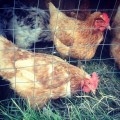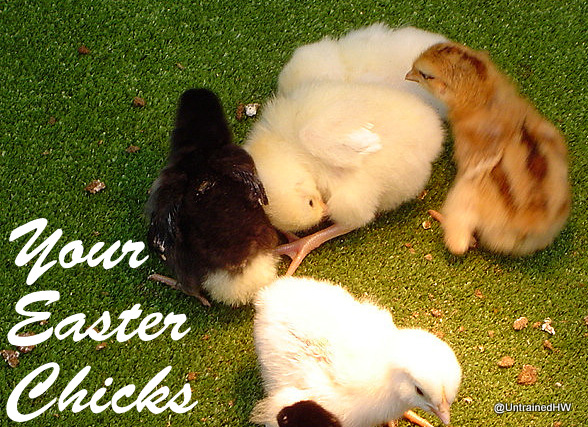
There are several little buff or red chicks in the mixed layers.
Our mail-order baby chicks have arrived at the ranch! We ordered from Hoovers Hatchery Poultry and ordered 80 chicks. We are splitting them with my in-laws so I’m not putting 80 chickens in the backyard, don’t worry. We have 40 Cornish Cross which will go into the freezer the end of May, and 40 heavy-layer mixed pullets (baby hens).

These bright yellow chicks are the Chicks-Who-Shall-Not-Be-Named
The Cornish Cross chickens are a breed that are specifically designed to grow very quickly and be ready for butchering in about 8 or 9 weeks. The breed is known to convert feed into body mass very efficiently. In my opinion, too efficiently. The birds are difficult to raise and keep as layers because they break legs very easily and can even hurt themselves (as in kill themselves) jumping off a regular chicken roost. Bottom line – these are highly specialized chickens that cannot be part of a homestead backyard chicken flock. They just aren’t suited to it. Part of that really bugs me.
On the other hand, they were purchased specifically for butchering anyway. I call them “The Chickens Who Shall Not be Named” in an effort to avoid growing too attached to them.

More examples of the variety of chicks we got in the mail-order package.
The other 40 chicks we ordered are my favorites. It’s a mixed package of laying hens in a multitude of breeds. I see at least six different breeds so far and will get individual photos later as the chicks get a little bit older. Once they are ready to be outside on a more full-time basis, we’ll go to the ranch and pick out 10 or 12 for ourselves to keep here at the house and the rest will live at the ranch. I cannot wait to see what happens as these chicks (who probably WILL be named) grow up and I can better see which specific breeds we have.









Please, don’t do this anymore. For them it’s already too late, but please don’t do it again. You don’t need to kill them, eat them, nor exploit them to be healthy. You say this bugs you, this is your heart speaking. It knows what’s the right thing to do.
I’m working on a post as a follow up to that, because we actually switched to a different breed of chickens that are much healthier and more resilient. We are meat eaters – most people eat meat in some form or fashion. And typically the most ecologically friendly cultures are those where people are highly connected to their food. I do not buy chicken, pork or beef from the grocery store. I raise it myself, give those chickens an amazing, healthy life, and kill them humanely. Are you completely vegan yourself? If you aren’t, you really don’t have the right to criticize. If you ARE then you clearly care about animals and the care they receive, which means you should be happy someone kind, caring, and humane took care of these animals vs an inhumane commercial grower and slaughtering house. Either way, I’d say your comment is not only over the top but completely missing the point of the article above. 🙂
Angela, I have to applaud you for being a wonderful role model for passionate care of your livestock (not pets, animals that provide for your family in exchange for you providing the best you can). I wish all poultry owners were as responsible and caring as you are.
And what do you eat to be healthy that doesn’t kill another animal? Vegetables, fruits, grain? When each of these are grown they displace many animals and even with organic measures insects are killed. Animals always die so that humans can survive.
I know insects, slugs, moles, etc. are aren’t nearly as cute as these chicks in the photo so maybe their lives aren’t valuable or don’t count? I think people like Angela who are raising their own food (both meat and produce) in an ethical way are doing an amazing thing. Those who buy their food with no concern about the animals or with a denial that somehow the food they eat doesn’t kill any animals are disillusioned.
All people live because animals are killed. The kindest thing we can do it to not deny the facts but raise animals in a humane way (which is why we don’t buy meat from the store either) and to farm in a way that does the least damage to the earth, the insects and the animals.
Whether someone chooses to eat meat or not is a very personal decision and one that shouldn’t be criticized by others. We should however, be banning together to end the unethical practices in commercial meat production.
I noticed you deleted my last comment.
In the meanwhile I collected some information you should find interesting if you are concerned as you say you are with the well being of your animals.
Regarding your argument about living creatures who might be harmed during harvesting; everyone would prefer to purchase produce guaranteed to have been grown without harm to any being, but this is not always possible. The processes of tilling, planting, and harvesting will probably always carry some risk for animals.
Nevertheless, a plant-based diet is still far more beneficial for animals than eating meat is. Not only do vegetarians save the life of the animal who would otherwise be slaughtered, they also save the lives of those who would be killed or hurt in growing the plants used to feed that animal. When you consider that we must feed a cow 16 pounds of plant material to get back one pound of beef, it becomes clear that by eating the plants directly, we save many times more lives. Currently, more than half of the U.S. grain supply is fed to farmed animals—grain that could be better used feeding the world’s population directly. A vegetarian diet is more efficient and less wasteful than a meat-based diet, in addition to being compassionate and causing the deaths of far fewer animals.
Hatcheries breed chickens to have “desirable” traits despite any negative effects this inbreeding may have on their health. It is also common for sickly chicks to be tossed out and left to die while male chicks, who do not produce eggs and are seen as disposable, are often ground up while still alive. Doing business with hatcheries encourages them to continue to breed and hurt chickens. The only ethical way to obtain chickens is to adopt them from animal shelters or rescue groups that have the birds’ best interests at heart.
Finally, yes, the best thing that anyone can do to help animals is to choose not to eat them, and we have so many choices as consumers that there’s simply no reason to use animals to feed ourselves. By making this choice, one will help animals and oneself: A vegan diet helps prevent strokes, osteoporosis, kidney stones, many types of cancer, diabetes, hypoglycemia, kidney disease, peptic ulcers, hernias, obesity, gallstones, hypertension, asthma, and many other diseases. For more information on the health benefits of being vegan visit [Link removed by blog owner. You can research the pros and cons of vegan lifestyle choices for yourself.].
Monica I did not delete your other comment. I am however removing the link in yours to an organization I do not support. Thanks for taking the time to comment. I always appreciate when people who criticize my lifestyle choices actually ARE vegan since most of the time they aren’t – something I find highly ironic.
As someone who lives in a major city, I find it fascinating that you can actually order baby chicks! I wish I could do this for my family. Thanks for writing about the process and helping me in my goal to learn something new everyday 🙂